A Historical Analysis of Hitler's Attack on Russia During World War II
VerifiedAdded on 2023/01/18
|9
|2674
|76
Essay
AI Summary
This essay provides a detailed analysis of Hitler's invasion of Russia during World War II. It begins by discussing Hitler's early life, political background, and the rise of the Nazi party, setting the stage for the narrative event of the invasion. The essay examines the German-Soviet Nonaggression Pact, the invasion's initial success, and the subsequent challenges faced by the German army, including the harsh Russian winter. It explores the strategic decisions made by Hitler, the military campaigns, and the impact of the invasion on both Germany and the Soviet Union, including the displacement of ethnic minorities. The analysis delves into Hitler's military strategies, such as the blitzkrieg, and the interference of American troops and their use of technology. The essay also discusses the rise and fall of Hitler, the role of the Axis and Allied powers, and the ultimate defeat of Germany, highlighting the impact of Hitler's actions on the course of the war and the world. It emphasizes the consequences of Hitler's underestimation of the Russian forces and the severe winter conditions, which contributed to Germany's downfall.
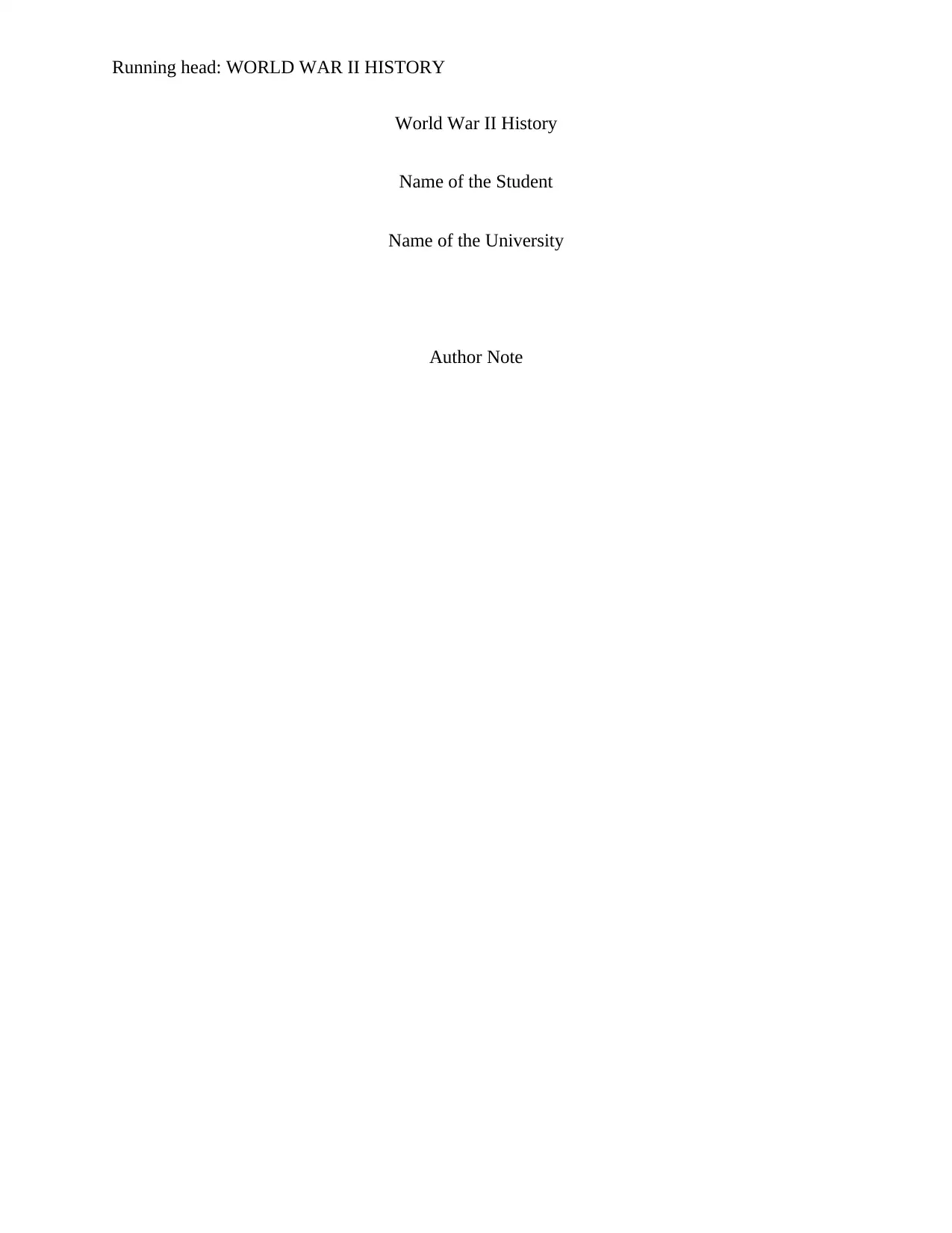
Running head: WORLD WAR II HISTORY
World War II History
Name of the Student
Name of the University
Author Note
World War II History
Name of the Student
Name of the University
Author Note
Paraphrase This Document
Need a fresh take? Get an instant paraphrase of this document with our AI Paraphraser
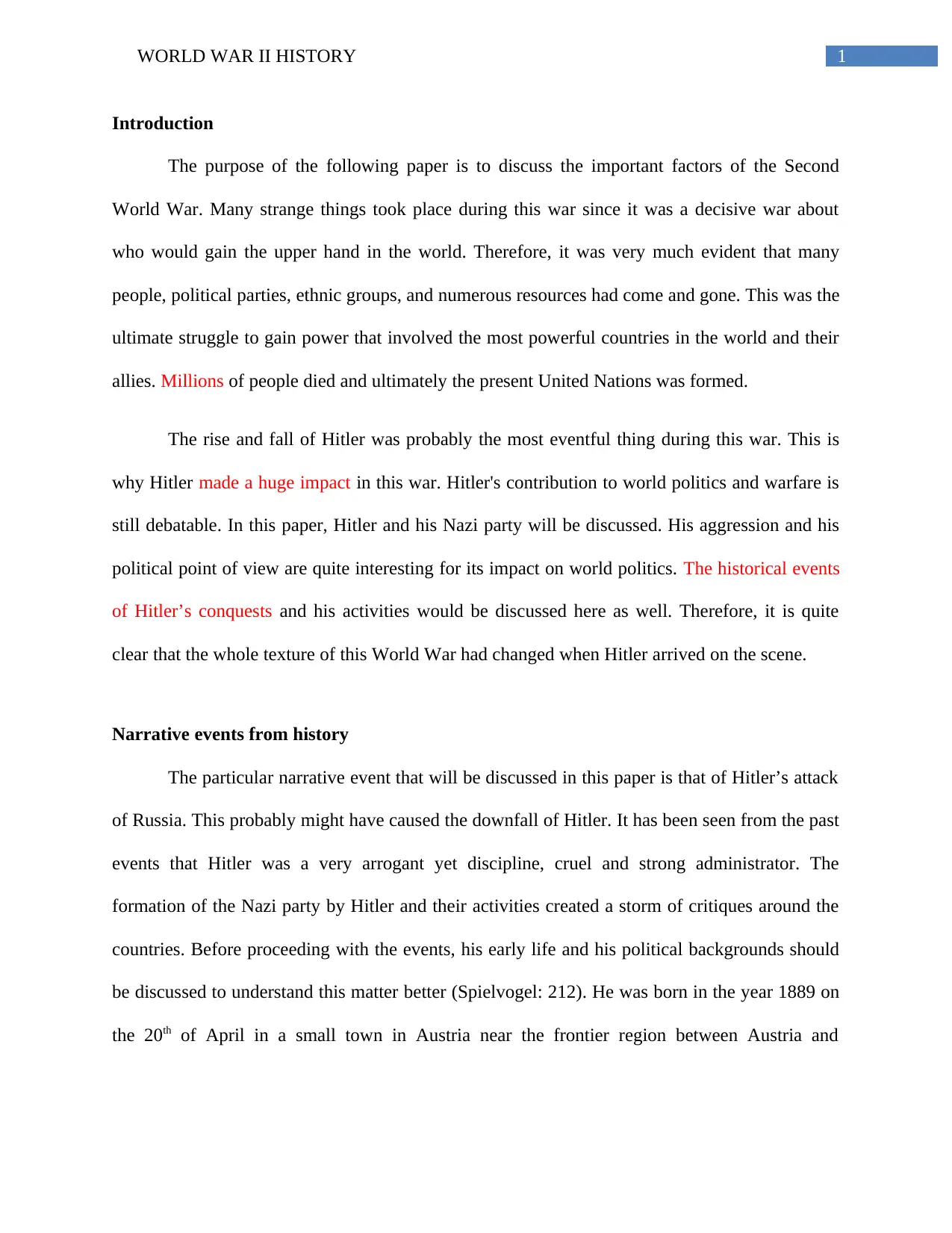
1WORLD WAR II HISTORY
Introduction
The purpose of the following paper is to discuss the important factors of the Second
World War. Many strange things took place during this war since it was a decisive war about
who would gain the upper hand in the world. Therefore, it was very much evident that many
people, political parties, ethnic groups, and numerous resources had come and gone. This was the
ultimate struggle to gain power that involved the most powerful countries in the world and their
allies. Millions of people died and ultimately the present United Nations was formed.
The rise and fall of Hitler was probably the most eventful thing during this war. This is
why Hitler made a huge impact in this war. Hitler's contribution to world politics and warfare is
still debatable. In this paper, Hitler and his Nazi party will be discussed. His aggression and his
political point of view are quite interesting for its impact on world politics. The historical events
of Hitler’s conquests and his activities would be discussed here as well. Therefore, it is quite
clear that the whole texture of this World War had changed when Hitler arrived on the scene.
Narrative events from history
The particular narrative event that will be discussed in this paper is that of Hitler’s attack
of Russia. This probably might have caused the downfall of Hitler. It has been seen from the past
events that Hitler was a very arrogant yet discipline, cruel and strong administrator. The
formation of the Nazi party by Hitler and their activities created a storm of critiques around the
countries. Before proceeding with the events, his early life and his political backgrounds should
be discussed to understand this matter better (Spielvogel: 212). He was born in the year 1889 on
the 20th of April in a small town in Austria near the frontier region between Austria and
Introduction
The purpose of the following paper is to discuss the important factors of the Second
World War. Many strange things took place during this war since it was a decisive war about
who would gain the upper hand in the world. Therefore, it was very much evident that many
people, political parties, ethnic groups, and numerous resources had come and gone. This was the
ultimate struggle to gain power that involved the most powerful countries in the world and their
allies. Millions of people died and ultimately the present United Nations was formed.
The rise and fall of Hitler was probably the most eventful thing during this war. This is
why Hitler made a huge impact in this war. Hitler's contribution to world politics and warfare is
still debatable. In this paper, Hitler and his Nazi party will be discussed. His aggression and his
political point of view are quite interesting for its impact on world politics. The historical events
of Hitler’s conquests and his activities would be discussed here as well. Therefore, it is quite
clear that the whole texture of this World War had changed when Hitler arrived on the scene.
Narrative events from history
The particular narrative event that will be discussed in this paper is that of Hitler’s attack
of Russia. This probably might have caused the downfall of Hitler. It has been seen from the past
events that Hitler was a very arrogant yet discipline, cruel and strong administrator. The
formation of the Nazi party by Hitler and their activities created a storm of critiques around the
countries. Before proceeding with the events, his early life and his political backgrounds should
be discussed to understand this matter better (Spielvogel: 212). He was born in the year 1889 on
the 20th of April in a small town in Austria near the frontier region between Austria and
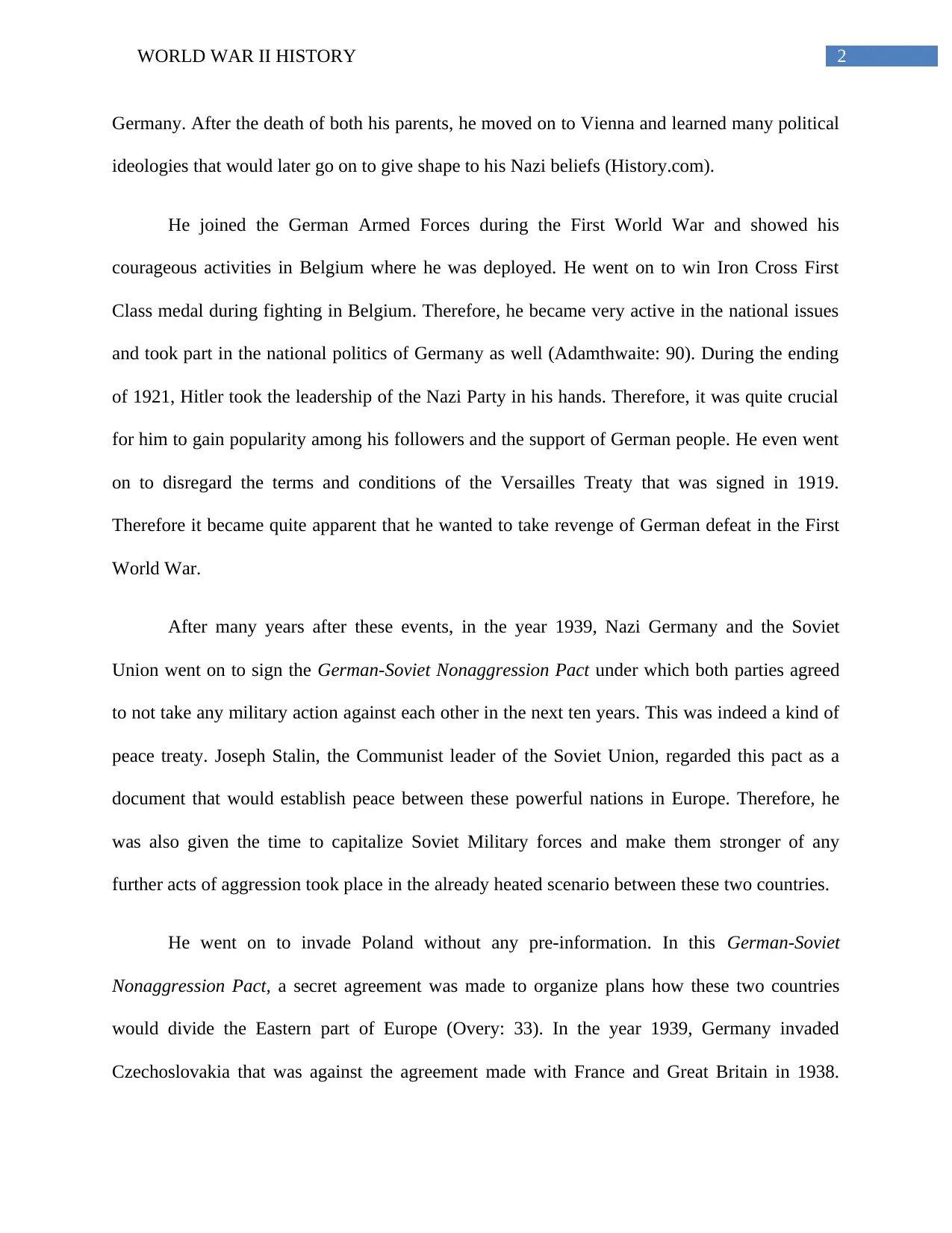
2WORLD WAR II HISTORY
Germany. After the death of both his parents, he moved on to Vienna and learned many political
ideologies that would later go on to give shape to his Nazi beliefs (History.com).
He joined the German Armed Forces during the First World War and showed his
courageous activities in Belgium where he was deployed. He went on to win Iron Cross First
Class medal during fighting in Belgium. Therefore, he became very active in the national issues
and took part in the national politics of Germany as well (Adamthwaite: 90). During the ending
of 1921, Hitler took the leadership of the Nazi Party in his hands. Therefore, it was quite crucial
for him to gain popularity among his followers and the support of German people. He even went
on to disregard the terms and conditions of the Versailles Treaty that was signed in 1919.
Therefore it became quite apparent that he wanted to take revenge of German defeat in the First
World War.
After many years after these events, in the year 1939, Nazi Germany and the Soviet
Union went on to sign the German-Soviet Nonaggression Pact under which both parties agreed
to not take any military action against each other in the next ten years. This was indeed a kind of
peace treaty. Joseph Stalin, the Communist leader of the Soviet Union, regarded this pact as a
document that would establish peace between these powerful nations in Europe. Therefore, he
was also given the time to capitalize Soviet Military forces and make them stronger of any
further acts of aggression took place in the already heated scenario between these two countries.
He went on to invade Poland without any pre-information. In this German-Soviet
Nonaggression Pact, a secret agreement was made to organize plans how these two countries
would divide the Eastern part of Europe (Overy: 33). In the year 1939, Germany invaded
Czechoslovakia that was against the agreement made with France and Great Britain in 1938.
Germany. After the death of both his parents, he moved on to Vienna and learned many political
ideologies that would later go on to give shape to his Nazi beliefs (History.com).
He joined the German Armed Forces during the First World War and showed his
courageous activities in Belgium where he was deployed. He went on to win Iron Cross First
Class medal during fighting in Belgium. Therefore, he became very active in the national issues
and took part in the national politics of Germany as well (Adamthwaite: 90). During the ending
of 1921, Hitler took the leadership of the Nazi Party in his hands. Therefore, it was quite crucial
for him to gain popularity among his followers and the support of German people. He even went
on to disregard the terms and conditions of the Versailles Treaty that was signed in 1919.
Therefore it became quite apparent that he wanted to take revenge of German defeat in the First
World War.
After many years after these events, in the year 1939, Nazi Germany and the Soviet
Union went on to sign the German-Soviet Nonaggression Pact under which both parties agreed
to not take any military action against each other in the next ten years. This was indeed a kind of
peace treaty. Joseph Stalin, the Communist leader of the Soviet Union, regarded this pact as a
document that would establish peace between these powerful nations in Europe. Therefore, he
was also given the time to capitalize Soviet Military forces and make them stronger of any
further acts of aggression took place in the already heated scenario between these two countries.
He went on to invade Poland without any pre-information. In this German-Soviet
Nonaggression Pact, a secret agreement was made to organize plans how these two countries
would divide the Eastern part of Europe (Overy: 33). In the year 1939, Germany invaded
Czechoslovakia that was against the agreement made with France and Great Britain in 1938.
⊘ This is a preview!⊘
Do you want full access?
Subscribe today to unlock all pages.

Trusted by 1+ million students worldwide
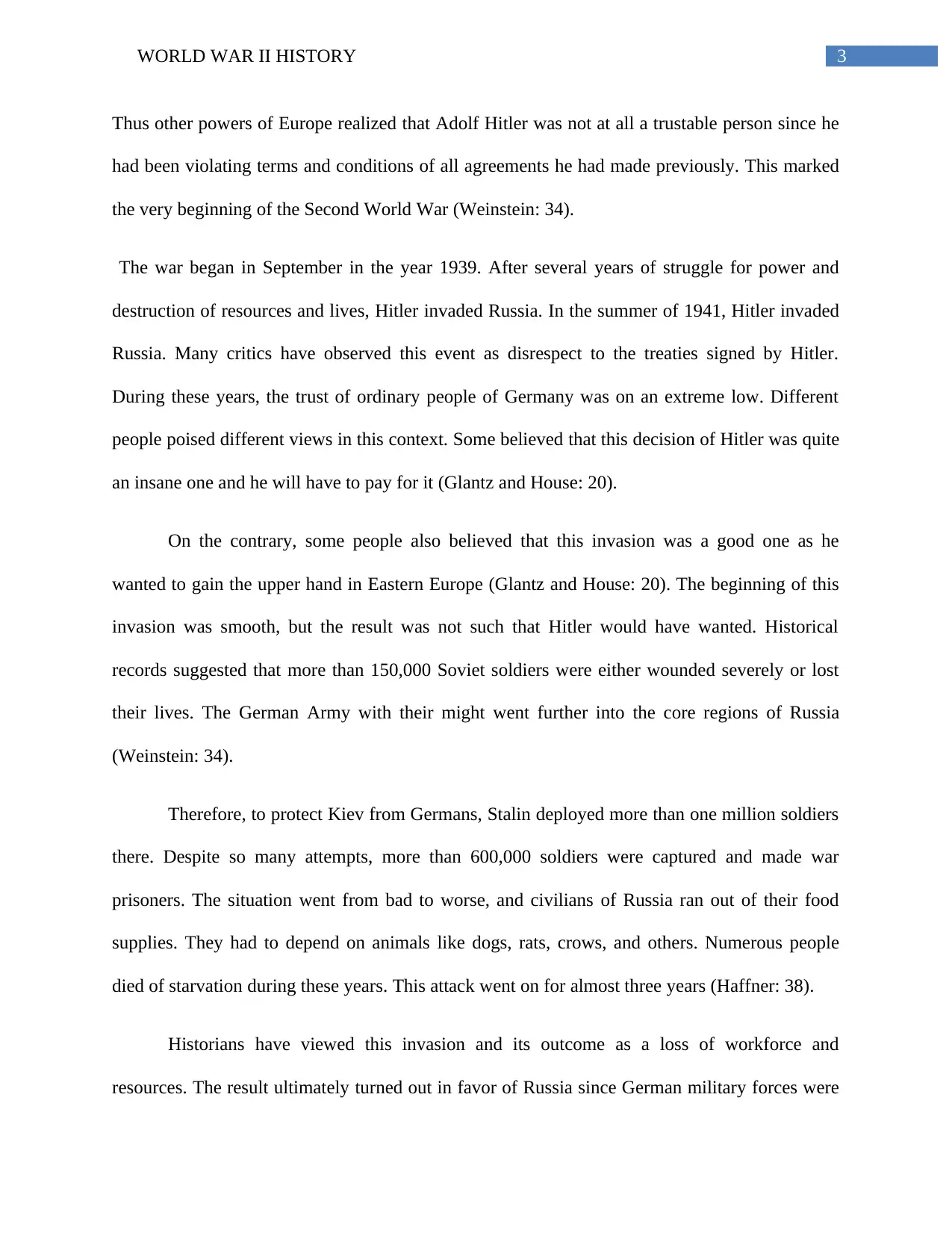
3WORLD WAR II HISTORY
Thus other powers of Europe realized that Adolf Hitler was not at all a trustable person since he
had been violating terms and conditions of all agreements he had made previously. This marked
the very beginning of the Second World War (Weinstein: 34).
The war began in September in the year 1939. After several years of struggle for power and
destruction of resources and lives, Hitler invaded Russia. In the summer of 1941, Hitler invaded
Russia. Many critics have observed this event as disrespect to the treaties signed by Hitler.
During these years, the trust of ordinary people of Germany was on an extreme low. Different
people poised different views in this context. Some believed that this decision of Hitler was quite
an insane one and he will have to pay for it (Glantz and House: 20).
On the contrary, some people also believed that this invasion was a good one as he
wanted to gain the upper hand in Eastern Europe (Glantz and House: 20). The beginning of this
invasion was smooth, but the result was not such that Hitler would have wanted. Historical
records suggested that more than 150,000 Soviet soldiers were either wounded severely or lost
their lives. The German Army with their might went further into the core regions of Russia
(Weinstein: 34).
Therefore, to protect Kiev from Germans, Stalin deployed more than one million soldiers
there. Despite so many attempts, more than 600,000 soldiers were captured and made war
prisoners. The situation went from bad to worse, and civilians of Russia ran out of their food
supplies. They had to depend on animals like dogs, rats, crows, and others. Numerous people
died of starvation during these years. This attack went on for almost three years (Haffner: 38).
Historians have viewed this invasion and its outcome as a loss of workforce and
resources. The result ultimately turned out in favor of Russia since German military forces were
Thus other powers of Europe realized that Adolf Hitler was not at all a trustable person since he
had been violating terms and conditions of all agreements he had made previously. This marked
the very beginning of the Second World War (Weinstein: 34).
The war began in September in the year 1939. After several years of struggle for power and
destruction of resources and lives, Hitler invaded Russia. In the summer of 1941, Hitler invaded
Russia. Many critics have observed this event as disrespect to the treaties signed by Hitler.
During these years, the trust of ordinary people of Germany was on an extreme low. Different
people poised different views in this context. Some believed that this decision of Hitler was quite
an insane one and he will have to pay for it (Glantz and House: 20).
On the contrary, some people also believed that this invasion was a good one as he
wanted to gain the upper hand in Eastern Europe (Glantz and House: 20). The beginning of this
invasion was smooth, but the result was not such that Hitler would have wanted. Historical
records suggested that more than 150,000 Soviet soldiers were either wounded severely or lost
their lives. The German Army with their might went further into the core regions of Russia
(Weinstein: 34).
Therefore, to protect Kiev from Germans, Stalin deployed more than one million soldiers
there. Despite so many attempts, more than 600,000 soldiers were captured and made war
prisoners. The situation went from bad to worse, and civilians of Russia ran out of their food
supplies. They had to depend on animals like dogs, rats, crows, and others. Numerous people
died of starvation during these years. This attack went on for almost three years (Haffner: 38).
Historians have viewed this invasion and its outcome as a loss of workforce and
resources. The result ultimately turned out in favor of Russia since German military forces were
Paraphrase This Document
Need a fresh take? Get an instant paraphrase of this document with our AI Paraphraser
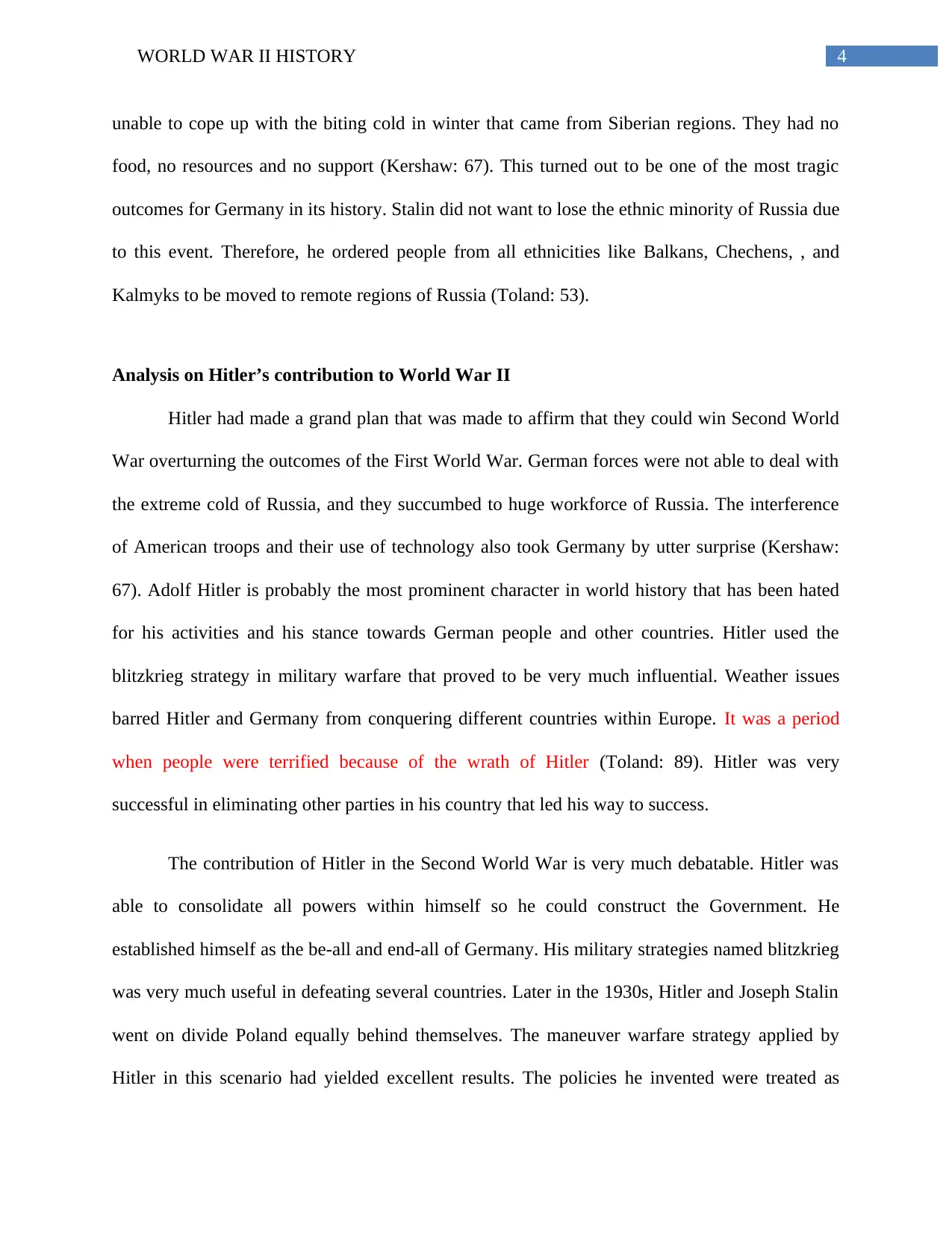
4WORLD WAR II HISTORY
unable to cope up with the biting cold in winter that came from Siberian regions. They had no
food, no resources and no support (Kershaw: 67). This turned out to be one of the most tragic
outcomes for Germany in its history. Stalin did not want to lose the ethnic minority of Russia due
to this event. Therefore, he ordered people from all ethnicities like Balkans, Chechens, , and
Kalmyks to be moved to remote regions of Russia (Toland: 53).
Analysis on Hitler’s contribution to World War II
Hitler had made a grand plan that was made to affirm that they could win Second World
War overturning the outcomes of the First World War. German forces were not able to deal with
the extreme cold of Russia, and they succumbed to huge workforce of Russia. The interference
of American troops and their use of technology also took Germany by utter surprise (Kershaw:
67). Adolf Hitler is probably the most prominent character in world history that has been hated
for his activities and his stance towards German people and other countries. Hitler used the
blitzkrieg strategy in military warfare that proved to be very much influential. Weather issues
barred Hitler and Germany from conquering different countries within Europe. It was a period
when people were terrified because of the wrath of Hitler (Toland: 89). Hitler was very
successful in eliminating other parties in his country that led his way to success.
The contribution of Hitler in the Second World War is very much debatable. Hitler was
able to consolidate all powers within himself so he could construct the Government. He
established himself as the be-all and end-all of Germany. His military strategies named blitzkrieg
was very much useful in defeating several countries. Later in the 1930s, Hitler and Joseph Stalin
went on divide Poland equally behind themselves. The maneuver warfare strategy applied by
Hitler in this scenario had yielded excellent results. The policies he invented were treated as
unable to cope up with the biting cold in winter that came from Siberian regions. They had no
food, no resources and no support (Kershaw: 67). This turned out to be one of the most tragic
outcomes for Germany in its history. Stalin did not want to lose the ethnic minority of Russia due
to this event. Therefore, he ordered people from all ethnicities like Balkans, Chechens, , and
Kalmyks to be moved to remote regions of Russia (Toland: 53).
Analysis on Hitler’s contribution to World War II
Hitler had made a grand plan that was made to affirm that they could win Second World
War overturning the outcomes of the First World War. German forces were not able to deal with
the extreme cold of Russia, and they succumbed to huge workforce of Russia. The interference
of American troops and their use of technology also took Germany by utter surprise (Kershaw:
67). Adolf Hitler is probably the most prominent character in world history that has been hated
for his activities and his stance towards German people and other countries. Hitler used the
blitzkrieg strategy in military warfare that proved to be very much influential. Weather issues
barred Hitler and Germany from conquering different countries within Europe. It was a period
when people were terrified because of the wrath of Hitler (Toland: 89). Hitler was very
successful in eliminating other parties in his country that led his way to success.
The contribution of Hitler in the Second World War is very much debatable. Hitler was
able to consolidate all powers within himself so he could construct the Government. He
established himself as the be-all and end-all of Germany. His military strategies named blitzkrieg
was very much useful in defeating several countries. Later in the 1930s, Hitler and Joseph Stalin
went on divide Poland equally behind themselves. The maneuver warfare strategy applied by
Hitler in this scenario had yielded excellent results. The policies he invented were treated as
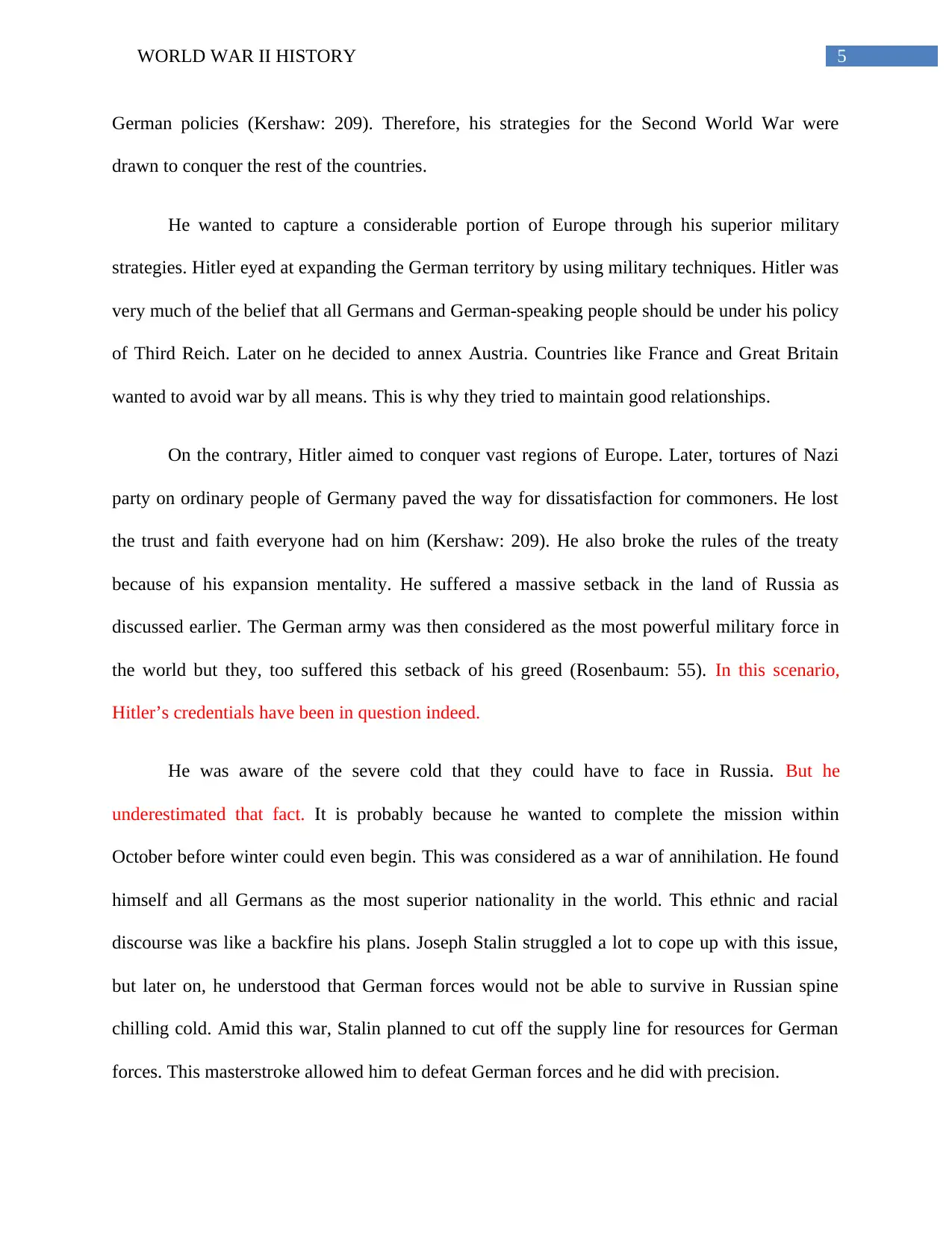
5WORLD WAR II HISTORY
German policies (Kershaw: 209). Therefore, his strategies for the Second World War were
drawn to conquer the rest of the countries.
He wanted to capture a considerable portion of Europe through his superior military
strategies. Hitler eyed at expanding the German territory by using military techniques. Hitler was
very much of the belief that all Germans and German-speaking people should be under his policy
of Third Reich. Later on he decided to annex Austria. Countries like France and Great Britain
wanted to avoid war by all means. This is why they tried to maintain good relationships.
On the contrary, Hitler aimed to conquer vast regions of Europe. Later, tortures of Nazi
party on ordinary people of Germany paved the way for dissatisfaction for commoners. He lost
the trust and faith everyone had on him (Kershaw: 209). He also broke the rules of the treaty
because of his expansion mentality. He suffered a massive setback in the land of Russia as
discussed earlier. The German army was then considered as the most powerful military force in
the world but they, too suffered this setback of his greed (Rosenbaum: 55). In this scenario,
Hitler’s credentials have been in question indeed.
He was aware of the severe cold that they could have to face in Russia. But he
underestimated that fact. It is probably because he wanted to complete the mission within
October before winter could even begin. This was considered as a war of annihilation. He found
himself and all Germans as the most superior nationality in the world. This ethnic and racial
discourse was like a backfire his plans. Joseph Stalin struggled a lot to cope up with this issue,
but later on, he understood that German forces would not be able to survive in Russian spine
chilling cold. Amid this war, Stalin planned to cut off the supply line for resources for German
forces. This masterstroke allowed him to defeat German forces and he did with precision.
German policies (Kershaw: 209). Therefore, his strategies for the Second World War were
drawn to conquer the rest of the countries.
He wanted to capture a considerable portion of Europe through his superior military
strategies. Hitler eyed at expanding the German territory by using military techniques. Hitler was
very much of the belief that all Germans and German-speaking people should be under his policy
of Third Reich. Later on he decided to annex Austria. Countries like France and Great Britain
wanted to avoid war by all means. This is why they tried to maintain good relationships.
On the contrary, Hitler aimed to conquer vast regions of Europe. Later, tortures of Nazi
party on ordinary people of Germany paved the way for dissatisfaction for commoners. He lost
the trust and faith everyone had on him (Kershaw: 209). He also broke the rules of the treaty
because of his expansion mentality. He suffered a massive setback in the land of Russia as
discussed earlier. The German army was then considered as the most powerful military force in
the world but they, too suffered this setback of his greed (Rosenbaum: 55). In this scenario,
Hitler’s credentials have been in question indeed.
He was aware of the severe cold that they could have to face in Russia. But he
underestimated that fact. It is probably because he wanted to complete the mission within
October before winter could even begin. This was considered as a war of annihilation. He found
himself and all Germans as the most superior nationality in the world. This ethnic and racial
discourse was like a backfire his plans. Joseph Stalin struggled a lot to cope up with this issue,
but later on, he understood that German forces would not be able to survive in Russian spine
chilling cold. Amid this war, Stalin planned to cut off the supply line for resources for German
forces. This masterstroke allowed him to defeat German forces and he did with precision.
⊘ This is a preview!⊘
Do you want full access?
Subscribe today to unlock all pages.

Trusted by 1+ million students worldwide
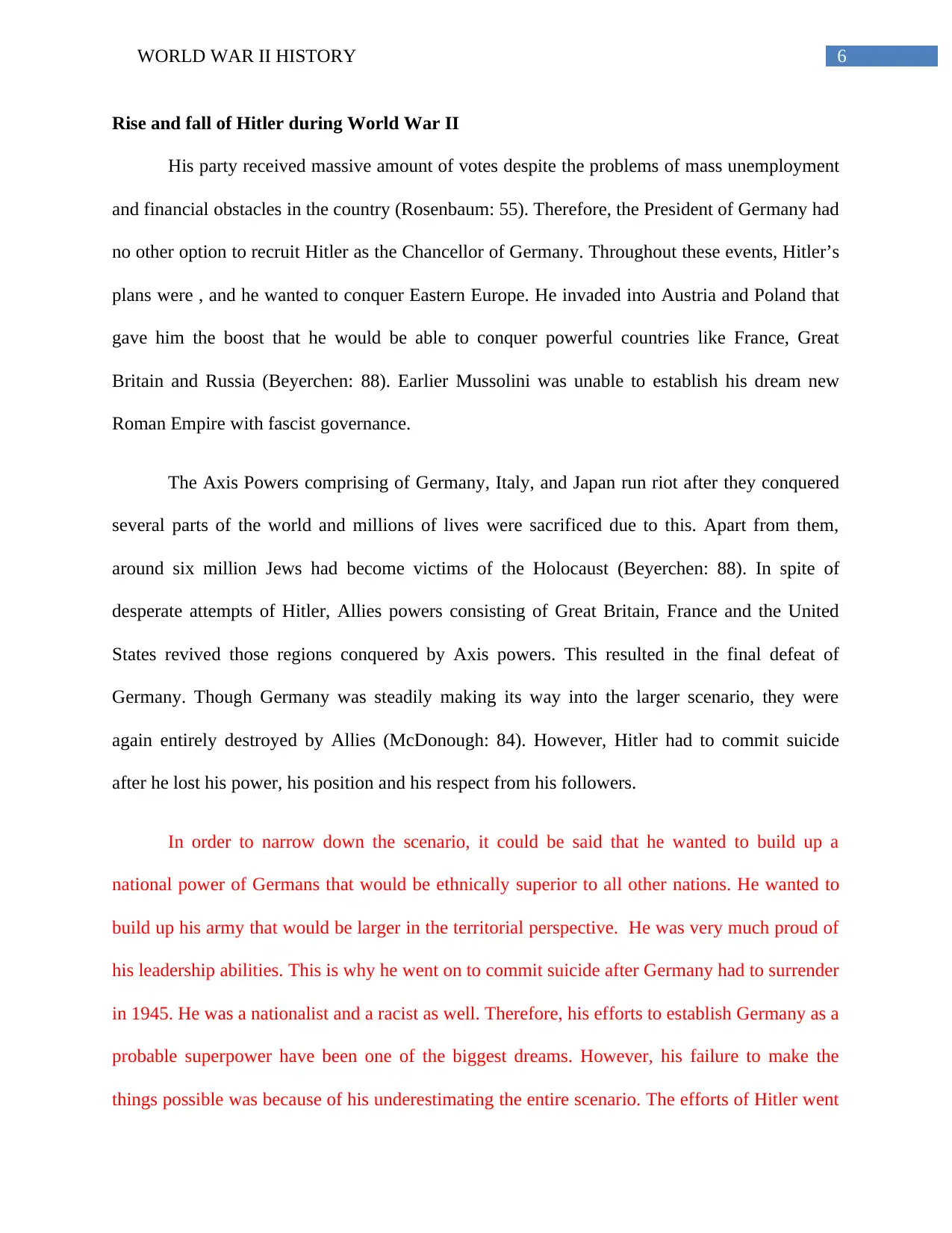
6WORLD WAR II HISTORY
Rise and fall of Hitler during World War II
His party received massive amount of votes despite the problems of mass unemployment
and financial obstacles in the country (Rosenbaum: 55). Therefore, the President of Germany had
no other option to recruit Hitler as the Chancellor of Germany. Throughout these events, Hitler’s
plans were , and he wanted to conquer Eastern Europe. He invaded into Austria and Poland that
gave him the boost that he would be able to conquer powerful countries like France, Great
Britain and Russia (Beyerchen: 88). Earlier Mussolini was unable to establish his dream new
Roman Empire with fascist governance.
The Axis Powers comprising of Germany, Italy, and Japan run riot after they conquered
several parts of the world and millions of lives were sacrificed due to this. Apart from them,
around six million Jews had become victims of the Holocaust (Beyerchen: 88). In spite of
desperate attempts of Hitler, Allies powers consisting of Great Britain, France and the United
States revived those regions conquered by Axis powers. This resulted in the final defeat of
Germany. Though Germany was steadily making its way into the larger scenario, they were
again entirely destroyed by Allies (McDonough: 84). However, Hitler had to commit suicide
after he lost his power, his position and his respect from his followers.
In order to narrow down the scenario, it could be said that he wanted to build up a
national power of Germans that would be ethnically superior to all other nations. He wanted to
build up his army that would be larger in the territorial perspective. He was very much proud of
his leadership abilities. This is why he went on to commit suicide after Germany had to surrender
in 1945. He was a nationalist and a racist as well. Therefore, his efforts to establish Germany as a
probable superpower have been one of the biggest dreams. However, his failure to make the
things possible was because of his underestimating the entire scenario. The efforts of Hitler went
Rise and fall of Hitler during World War II
His party received massive amount of votes despite the problems of mass unemployment
and financial obstacles in the country (Rosenbaum: 55). Therefore, the President of Germany had
no other option to recruit Hitler as the Chancellor of Germany. Throughout these events, Hitler’s
plans were , and he wanted to conquer Eastern Europe. He invaded into Austria and Poland that
gave him the boost that he would be able to conquer powerful countries like France, Great
Britain and Russia (Beyerchen: 88). Earlier Mussolini was unable to establish his dream new
Roman Empire with fascist governance.
The Axis Powers comprising of Germany, Italy, and Japan run riot after they conquered
several parts of the world and millions of lives were sacrificed due to this. Apart from them,
around six million Jews had become victims of the Holocaust (Beyerchen: 88). In spite of
desperate attempts of Hitler, Allies powers consisting of Great Britain, France and the United
States revived those regions conquered by Axis powers. This resulted in the final defeat of
Germany. Though Germany was steadily making its way into the larger scenario, they were
again entirely destroyed by Allies (McDonough: 84). However, Hitler had to commit suicide
after he lost his power, his position and his respect from his followers.
In order to narrow down the scenario, it could be said that he wanted to build up a
national power of Germans that would be ethnically superior to all other nations. He wanted to
build up his army that would be larger in the territorial perspective. He was very much proud of
his leadership abilities. This is why he went on to commit suicide after Germany had to surrender
in 1945. He was a nationalist and a racist as well. Therefore, his efforts to establish Germany as a
probable superpower have been one of the biggest dreams. However, his failure to make the
things possible was because of his underestimating the entire scenario. The efforts of Hitler went
Paraphrase This Document
Need a fresh take? Get an instant paraphrase of this document with our AI Paraphraser
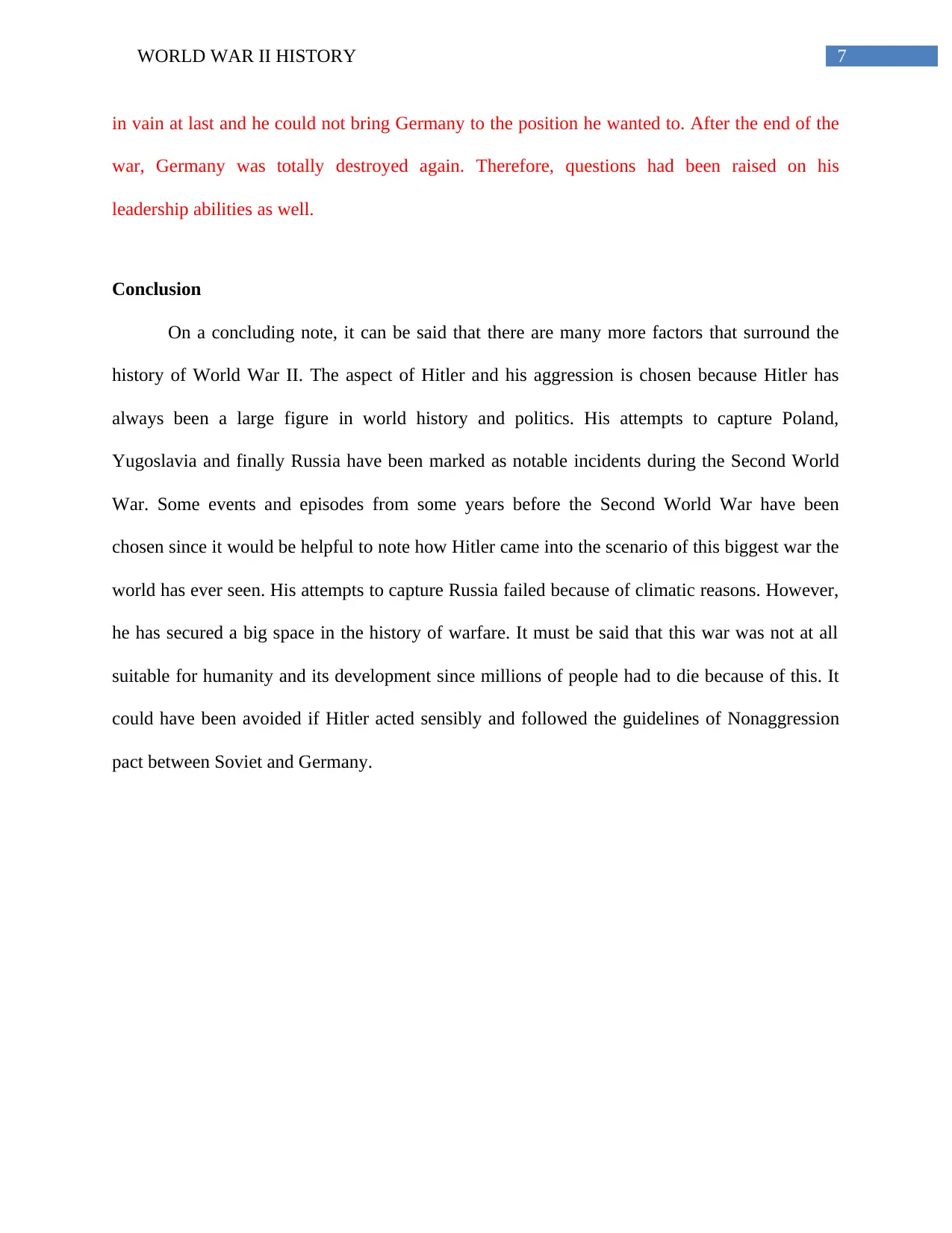
7WORLD WAR II HISTORY
in vain at last and he could not bring Germany to the position he wanted to. After the end of the
war, Germany was totally destroyed again. Therefore, questions had been raised on his
leadership abilities as well.
Conclusion
On a concluding note, it can be said that there are many more factors that surround the
history of World War II. The aspect of Hitler and his aggression is chosen because Hitler has
always been a large figure in world history and politics. His attempts to capture Poland,
Yugoslavia and finally Russia have been marked as notable incidents during the Second World
War. Some events and episodes from some years before the Second World War have been
chosen since it would be helpful to note how Hitler came into the scenario of this biggest war the
world has ever seen. His attempts to capture Russia failed because of climatic reasons. However,
he has secured a big space in the history of warfare. It must be said that this war was not at all
suitable for humanity and its development since millions of people had to die because of this. It
could have been avoided if Hitler acted sensibly and followed the guidelines of Nonaggression
pact between Soviet and Germany.
in vain at last and he could not bring Germany to the position he wanted to. After the end of the
war, Germany was totally destroyed again. Therefore, questions had been raised on his
leadership abilities as well.
Conclusion
On a concluding note, it can be said that there are many more factors that surround the
history of World War II. The aspect of Hitler and his aggression is chosen because Hitler has
always been a large figure in world history and politics. His attempts to capture Poland,
Yugoslavia and finally Russia have been marked as notable incidents during the Second World
War. Some events and episodes from some years before the Second World War have been
chosen since it would be helpful to note how Hitler came into the scenario of this biggest war the
world has ever seen. His attempts to capture Russia failed because of climatic reasons. However,
he has secured a big space in the history of warfare. It must be said that this war was not at all
suitable for humanity and its development since millions of people had to die because of this. It
could have been avoided if Hitler acted sensibly and followed the guidelines of Nonaggression
pact between Soviet and Germany.
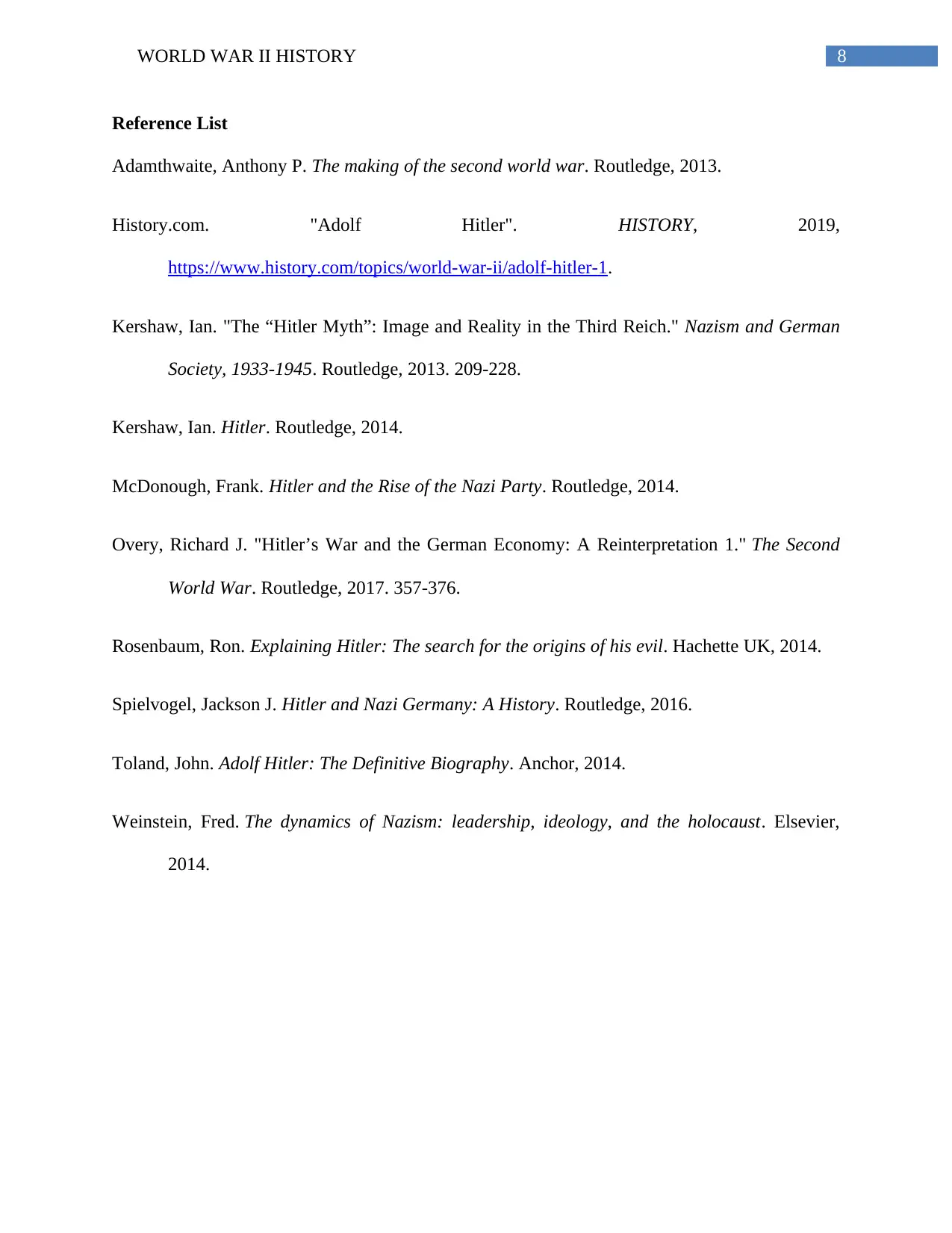
8WORLD WAR II HISTORY
Reference List
Adamthwaite, Anthony P. The making of the second world war. Routledge, 2013.
History.com. "Adolf Hitler". HISTORY, 2019,
https://www.history.com/topics/world-war-ii/adolf-hitler-1.
Kershaw, Ian. "The “Hitler Myth”: Image and Reality in the Third Reich." Nazism and German
Society, 1933-1945. Routledge, 2013. 209-228.
Kershaw, Ian. Hitler. Routledge, 2014.
McDonough, Frank. Hitler and the Rise of the Nazi Party. Routledge, 2014.
Overy, Richard J. "Hitler’s War and the German Economy: A Reinterpretation 1." The Second
World War. Routledge, 2017. 357-376.
Rosenbaum, Ron. Explaining Hitler: The search for the origins of his evil. Hachette UK, 2014.
Spielvogel, Jackson J. Hitler and Nazi Germany: A History. Routledge, 2016.
Toland, John. Adolf Hitler: The Definitive Biography. Anchor, 2014.
Weinstein, Fred. The dynamics of Nazism: leadership, ideology, and the holocaust. Elsevier,
2014.
Reference List
Adamthwaite, Anthony P. The making of the second world war. Routledge, 2013.
History.com. "Adolf Hitler". HISTORY, 2019,
https://www.history.com/topics/world-war-ii/adolf-hitler-1.
Kershaw, Ian. "The “Hitler Myth”: Image and Reality in the Third Reich." Nazism and German
Society, 1933-1945. Routledge, 2013. 209-228.
Kershaw, Ian. Hitler. Routledge, 2014.
McDonough, Frank. Hitler and the Rise of the Nazi Party. Routledge, 2014.
Overy, Richard J. "Hitler’s War and the German Economy: A Reinterpretation 1." The Second
World War. Routledge, 2017. 357-376.
Rosenbaum, Ron. Explaining Hitler: The search for the origins of his evil. Hachette UK, 2014.
Spielvogel, Jackson J. Hitler and Nazi Germany: A History. Routledge, 2016.
Toland, John. Adolf Hitler: The Definitive Biography. Anchor, 2014.
Weinstein, Fred. The dynamics of Nazism: leadership, ideology, and the holocaust. Elsevier,
2014.
⊘ This is a preview!⊘
Do you want full access?
Subscribe today to unlock all pages.

Trusted by 1+ million students worldwide
1 out of 9
Related Documents
Your All-in-One AI-Powered Toolkit for Academic Success.
+13062052269
info@desklib.com
Available 24*7 on WhatsApp / Email
![[object Object]](/_next/static/media/star-bottom.7253800d.svg)
Unlock your academic potential
Copyright © 2020–2026 A2Z Services. All Rights Reserved. Developed and managed by ZUCOL.





